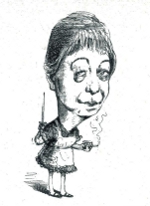
DOROTHY PARKER
Just a Little Jewish Girl Trying to Be Cute

DOROTHY ROTHSCHILD was born in West End, New Jersey, on August 22, 1893, to a Jewish father and a Scottish-American mother who died in her infancy. Her father remarried, and Dorothy was raised by a stepmother who sent her to a Catholic convent school and later to a private finishing school.
In 1917, following her first literary job as a caption writer for Vogue, she became a reviewer for Vanity Fair, where Robert Benchley was her editor. She was fired on the grounds that her reviews were too tough, and Benchley quit in sympathy. They shared a free-lance office for a time, which prompted her famous crack: “If the office had been any smaller, it would have been adultery.”
Her marriage to Edwin Pond Parker II of Hartford lasted only a few years, but she continued to use his name, finding it preferable to her own.
In 1925, she was one of a group of writers who helped Harold Ross found The New Yorker, and she became its drama critic in 1927, writing stinging book reviews under the pseudonym of “Constant Reader.” Her short stories appeared in the magazine until 1955. She produced light, satirical verse and pessimistic short stories about loneliness, disillusionment, love gone wrong, and suicide. She was never satisfied with her literary efforts—she strove for truth and purity but never felt she had achieved them. About her verse she once said, “I’m always chasing Rimbauds.”
Her screenwriting credits include the original version of A Star Is Born, and she collaborated on two plays, Close Harmony with Elmer Rice and Ladies of the Corridor with Arnaud D’Usseau.
In 1933, she married Alan Campbell, an actor-writer eleven years her junior and a homosexual. They went to Hollywood together as screenwriters, were divorced in 1947, and remarried in 1950. When Campbell died in 1963, Mrs. Parker returned to New York to live out her remaining years.
Her reputation as a wit was based more on her conversational bon mots than on her writing, and it grew to the point that many clever remarks were erroneously attributed to her, even though she scrupulously disavowed them. Conversely, two of her most famous lines have been repeatedly misattributed to others: “You can lead a horticulture but you can’t make her think” and “Men seldom make passes at girls who wear glasses” (which is frequently misquoted as “Men never make passes at girls who wear glasses.”)
She was the only regular female member of the Algonquin Round Table, and her cynicism extended to the vicious circle itself: “The Round Table thing was greatly overrated. It was full of people looking for a free lunch and asking, ‘Did you hear the funny thing I said yesterday?’ ”
She ridiculed what she considered cultural snobbery: When asked if she had attended the most recent performance of the Philharmonic or the latest museum exhibit, her standard reply was, “I’ve been too fucking busy and vice versa.”
Toward the end of her life she had difficulty writing and missed book review deadlines until she was no longer assigned to write them. But her oral wit remained intact; she still talked brilliantly about her reading material, which remained voluminous and eclectic until her death. But having outlived her fame, she became a bitter, alcoholic recluse. She attempted suicide several times and died in 1967 at the age of seventy-four.
Mrs. Parker’s description of herself is emblematic of her attitude toward the rest of the world: “Boy, did I think I was smart. I was just a little Jewish girl trying to be cute.”